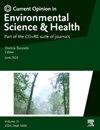Enhanced microbial strategies to mitigate microplastic transfer via composting to agricultural ecosystems—A short review
IF 6.6
Q1 ENVIRONMENTAL SCIENCES
Current Opinion in Environmental Science and Health
Pub Date : 2025-04-29
DOI:10.1016/j.coesh.2025.100625
引用次数: 0
Abstract
Microplastics (MPs) are emerging pollutants of critical concern, acting as substrates for microbial colonization while releasing toxic compounds. Composting, a key method for organic waste recycling, serves as a major pathway for MPs to enter agricultural ecosystems but MPs disturb decomposition processes and alter microbial successions. This review explores interactions between MPs and microbial communities in composting, focusing on plastisphere dynamics and ecological implications. Microbial strategies including biostimulation, bioaugmentation, advanced composting technologies, and innovations in synthetic biology are highlighted for mitigating MP impacts. Advanced approaches, including hyperthermophilic or mineral-supplemented composting paired with plastic-degrading microbes, are viable options in practical composting. Future research should prioritize microbial interactions in the composting plastisphere, enzyme identification, and biosynthetic pathway optimization by interdisciplinary approaches to achieve sustainable organic waste management.
加强微生物策略以减轻通过堆肥向农业生态系统的微塑料转移-简要综述
微塑料(MPs)是一种备受关注的新兴污染物,作为微生物定植的底物,同时释放有毒化合物。堆肥是有机废物回收的关键方法,是MPs进入农业生态系统的主要途径,但MPs干扰分解过程并改变微生物演替。这篇综述探讨了堆肥中MPs和微生物群落之间的相互作用,重点是塑性圈动力学和生态意义。微生物策略包括生物刺激、生物强化、先进的堆肥技术和合成生物学的创新,以减轻MP的影响。先进的方法,包括超嗜热或矿物质补充堆肥与塑料降解微生物配对,是实际堆肥的可行选择。未来的研究应优先考虑微生物在堆肥塑料圈中的相互作用、酶鉴定和跨学科方法的生物合成途径优化,以实现可持续的有机废物管理。
本文章由计算机程序翻译,如有差异,请以英文原文为准。
求助全文
约1分钟内获得全文
求助全文
来源期刊

Current Opinion in Environmental Science and Health
Medicine-Public Health, Environmental and Occupational Health
CiteScore
14.90
自引率
0.00%
发文量
92
审稿时长
114 days
 求助内容:
求助内容: 应助结果提醒方式:
应助结果提醒方式:


